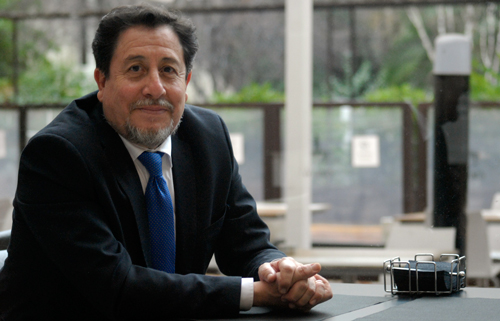Photo: A.R.
Pablo Recalde / Director of the WFP for the Congo
Alberto Rubio. Madrid
Pablo Recalde, director of the World Food Programme (WFP) in the Congo, has come to Spain looking for companies to support development projects. He was encouraged by the Spanish Ambassador to the African country, Javier Hergueta, whose professionalism he values: “We got along with each other immediately and we started looking for ways to collaborate”.
How have companies received your proposals?
Very well. There is great interest to participate in these development projects. I met associations of exporters, which represent 60% of Spain’s GDP. There are around a hundred strong companies, from the biggest to smaller producers, but all of them are placing Spain in the highest positions of the world production.
Were they convinced?
Although the Spanish Cooperation at the moment is not one of the greatest in the world, there is a commitment in the private sector to join this plan, because it has been noticed that if they can improve the life conditions of a nation, that nation will develop as a consumer of their products. That is why I am here, to facilitate the entry of companies and to make sure they help us meet our needs.
What can the Congo offer?
It is a country with an impressive potential and natural richness. It has been calculated that the mineral richness, in coltan, diamonds, gold or oil, can be bigger than the world GDP. Logically, many countries want a piece of that cake. We have Chinese investments and from other countries that are traditionally connected to the Belgian Congo.
But those investors are only looking for raw materials.
That’s right. To revert that equation we need three things: good governance, energy and access. With that, African countries will develop on their own. They have markets and the ability to consume enough to create wealth.
I guess energy is fundamental, isn’t it?
The three things I mentioned are. If you have energy but agriculture has no access to trade, it is not profitable. We try to open those paths and to promote trade through them accurately, because a ton of corn in the Congo costs 350 dollars, whereas it costs 200 in Zambia or Tanzania. It is impossible to be competitive that way. But it is also necessary to have a good government that takes its people into account and respects human rights, property, investments. That development, which is linked to the humanitarian context, will not be carried out by us, but by the Congolese.
And, can Spanish companies fit there?
The Congo is a forgotten country that has much to offer. We have discussed with exporters an intelligent way to enter. The United Nations can help investors to have a positive and non-extractive presence before the population, like in the colonial past, to which we cannot go back.
How are development and humanitarian aid connected?
70% of the food consumed by the poorest comes from small farmers, who are also poor. That is why we try, along with the FAO, to promote small farmers. We teach them to think as investors to improve the quality of their products, to reduce losses per harvest and to open markets beyond what the WFP buys from them.
It may be soon to talk about results.
Well, we have some. Spain has 80% of chances to get a very important contract of the hydroelectric station of INDA. I’m talking about 8 or 10 million dollars in the energy sector, but also in agricultural developments in the area. We have already discussed that very specifically.
What are the figures of the WFP in the Congo?
In this moment, we provide food for 1,400,000 internally displaced people and for 200,000 refugees. We provide logistic support with our planes for the entire humanitarian community, because the Congo, with 2.5 million square kilometres, is a continent itself, but with big problems of access to many areas.
And, how much does that work cost?
We need 120 million for internally displaced people; 30 for refugees; 28 for the air service; 21 to develop access roads. In all, around 200 million dollars per year. We buy 54,000 tons of food every year and we distribute 11 million dollars among those in need, through phones, credit cards or cash.
Do you think it is possible to achieve your objectives?
It is possible, but we have to do it together and the role played by the private sector is absolutely essential. If we do not reduce poverty, we will not be able to increase consumption to maintain a market economy. There is a public responsibility, but the private commitment is now more important than ever in a very complex and difficult world context.






